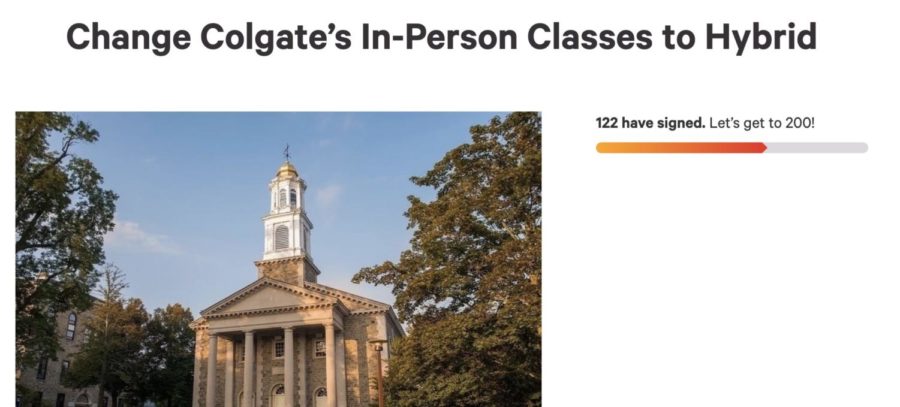Petition Created To Change Colgate’s In-Person Classes To Hybrid
An account under the name of Winston Berkeley created a Change.org petition asking Colgate administration to change in-person classes to a hybrid format, which would allow students to take in-person classes remotely. As of Monday, March 15, the petition has 122 signatures out of a 200-signature goal.
The Maroon-News was unable to find the name Winston Berkeley in the Colgate student directory, suggesting that the petition’s creator used a pseudonym.
The petition, created Friday, March 5, claims that increasing Commitment to Community Health violations have made some students uncomfortable attending in-person classes, asking that all in-person classes move to hybrid format as a protection.
“With rampant and severe violations of the Commitment to Community Health (CCH) being brought to our attention, many of us in the student body have lost trust in our fellow peers,” the petition states. “We believe it is not fair that those of us who have upheld our promises outlined in the CCH (but are put in jeopardy by less committed peers) should have to choose between our safety/mental health or academic success.”
President Brian Casey said that when he saw the petition he sent it straight to the Emergency Operations Center (EOC). While he recognizes the petition as a signal of student concern, he said any change in course modality would be a result only of health analytics data. Since surveillance and wastewater testing showed no significant increase in infection rates following the recent increase in violations, the University is not likely to make the change unless the data indicates the campus must move backward in Gates. Casey reaffirmed his confidence in the EOC and the Health Analytics Team to make decisions considering all the data points, one of them being Commitment violations.
“The decision about remote versus in-person instruction is really driven by the health data,” Casey said. “The petition’s a signal of concern, and I understand that. But the way I have to respond to it is to rely on the Health Analytics Group that is looking at Commitment violations… Let’s rely on the systems that have done us well rather than get reactive.”
First-year Max Parrott expressed his support for the petition.
“It was not something I had thought about much prior to reading about it,” Parrott said. “I am not sure that I would personally benefit from having hybrid classes, but I do think the argument is fairly logical and that the switch could make sense given the volatility of current-day life. It sounds like hybrid classes could really help others out, and I think that’s what matters, so I am in support of it.”
Sophomore Sarah Harris agreed with Parrott and discussed a variety of reasons to support the shift to hybrid classes.
“Colgate’s in-person classes should be modified to allow for the hybrid format. [Between] Community Health violations, beginning of sports seasons and tours being offered, our campus is much more open this semester, and students who are uncomfortable with that should not have to miss out on their education,” Harris said.
Senior Peter Hartman wrote a comment of support for the petition on its webpage. He said he believes the use of a pseudonym has a specific purpose.
“We didn’t want to use ad hominem attacks on the administration, but we did want to come up with creative solutions to the problems that we all face on campus,” Hartman said, clarifying that he used the word “we” in reference to others who might have the same opinion as he does.
However, students have mixed feelings about the effect of the pseudonym on the legitimacy of the petition.
“The legitimacy of the petition, unfortunately, changes as a result of the creator using a pseudonym. If the creator isn’t even openly supporting it, how can they expect someone else to support it? I did not sign the petition as a result of it being under a pseudonym,” Harris said.
Parrott supplied possible reasons for the creator of the petition to use anonymity.
“I think the likely scenario is that the creator prefers for this to be anonymous to simply avoid controversy with friends, other students, or even teachers,” Parrott said. “A less likely, but possible, scenario is that the creator’s original name would reveal something more about their motives for wanting hybrid classes and thus diminish the chances of it going through.”
Casey said the fact that the petition is created by a pseudonym does not change the administration’s response. Casey also commented on the feasibility of switching all in-person classes to hybrid.
“It’s not that simple a thing to do because there are several hundred courses and you would have to alert the faculty we’re moving back to a new, different form of pedagogy,” Casey said.
Casey said the EOC and the Health Analytics team were extremely concerned about the Commitment violations and responded by continuing to keep COVID-19 testing levels high, diverging from the original plan of having testing levels be lowered.
“[Maintaining high testing levels is] not inexpensive,” Casey said. “I’m gonna keep it high until at least through this gate and maybe through the next one.”
The greater concern with the petition, Casey said, is what it reveals about student concerns.
“What it reveals is anxiety about the Commitment violations, and I have to take that quite seriously. There’s two distinct narratives: there’s significant Commitment violations, and that makes [some students] feel unsafe, then there’s the [notion that we, the administration, are] all being too mean. They’re two distinct narratives that sometimes feel like they’re coming from two different campuses,” Casey said.
Assistant Professor of History and Native American Studies Ryan Hall said that last semester, in one of his in-person classes, he gave his students the choice to take the course remotely. Most of the class chose this option. This semester, he required on-campus students to take his class in-person.
“At that point, keeping track of both groups became so unwieldy that it made more sense for me to take the class to fully remote. I found that experience very dispiriting, given the huge amount of effort that went into bringing everyone back to Colgate this year,” Hall said. “I believe it reasonable for professors to choose to ask students who are on campus and feeling well to attend classes in person.”
Parrott said he felt Colgate administration is unlikely to respond to the petition by switching in-person classes to a hybrid format.
“I personally believe the administration is of the belief that we will make it to the end of the semester without any outbreaks and that they have a backup plan to go remote in the case of an outbreak. Also, I am not sure that enough students strongly believe in this cause such that the administration will hear their requests and make the switch now,” Parrott said. “I feel like a hybrid switch for in-person classes may almost feel intimidating for teachers and the administration that would have to figure out the logistics of the switch as well as deal with any technical issues that arise.”









